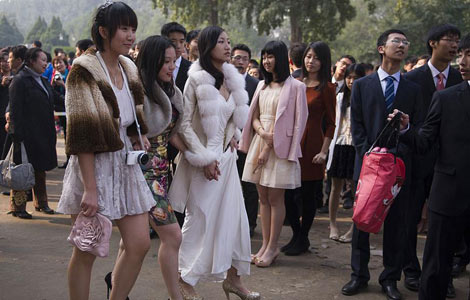Consumer spending falls short
Updated: 2013-10-18 23:31
By WANG YING in Shanghai (China Daily)
|
||||||||
 |
|
Shoppers browse through an IKEA store in Shanghai. According to experts, consumer spending in the United States has been as much as 70 percent of the economy, compared with 45.9 percent in China in the first three quarters. Provided to China Daily |
Experts say still significant space for increase in domestic consumption
Consumer spending contributed 45.9 percent of the nation's economic growth in the first three quarters of 2013, falling short of becoming a major driver for GDP expansion, the spokesman for the National Bureau of Statistics said on Friday.
Investment generated 55.8 percent of the growth, which stood at 7.8 percent, Sheng Laiyun told a news conference in Beijing.
Retail sales increased 12.9 percent year-on-year to 16.88 trillion yuan ($2.75 trillion), the NBS said.
Bullish conditions in the property market, where analysts have said that new sales records could be set this year, drove consumption in several other sectors, such as home appliances, furniture, construction and interior decoration materials.
Figures from the Ministry of Commerce showed that in the first nine months, sales of home appliances, furniture and construction materials grew 10.4 percent, 6.5 percent and 5.3 percent, respectively.
Online shopping remained vibrant in the first three quarters, and retail spending via the Web is estimated at 1.3 trillion yuan, equivalent to the full-year figure for 2012.
Experts said that there is still huge room for China's consumer spending to grow.
Liu Shengjun, executive deputy director of the China Europe International Business School's Lujiazui Institute of International Finance, said that compared with international standards, China's economy is still more investment-driven.
According to Liu, consumer spending in the United States has been as much as 70 percent of the economy. Although the weighting dropped in recent years, spending is still a main driver of the world's largest economy.
Liu suggested that a healthier Chinese economy should have at least half of its GDP generated by domestic consumption.
Zhu Lianqing, an economist at the Shanghai Academy of Social Sciences, said that consumer spending is being constrained because prices are rising too quickly.
"If we exclude the price rise, there would have been even less of an increase in actual spending," said Zhu.
Real urban incomes rose just 6.8 percent in the first three quarters, far below the growth rate of GDP, a Bank of Communications Co report said.
There is no specific remedy for this situation, although experts have high expectations for the upcoming third plenary session of the 18th Central Committee of the Communist Party of China.
"A lot can be done through the development of a market-oriented economy, as well as setting up a better social security net in terms of education, medical care and so forth, so people can spend money with less hesitation," said Liu.
But Yin Xiangshuo of Fudan University in Shanghai said that the nation's economic transformation requires more investment rather than more spending.
"Without any investment, spending alone can drive the economy nowhere," he said.
wang_ying@chinadaily.com.cn
Most Viewed
Editor's Picks

|

|

|

|

|

|
Today's Top News
No secret papers for Russia, says Snowden
Stable growth 'paves way for reforms'
Chinese firm buying NY landmark
Workers' right to a rest stressed
China, EU to hold investment talks
Students asked to show poverty for grants
Mandatory student internships under fire
Shanghai to reduce PM2.5 20%
US Weekly

|

|














